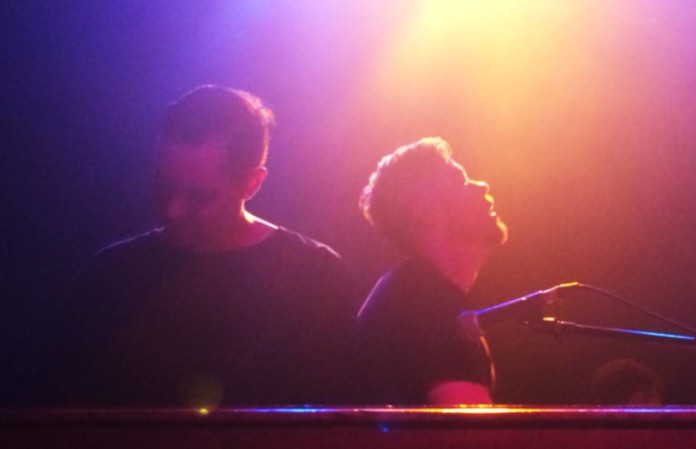A regular Friday night turned into a more than pleasant evening with the touring jazz, pop, sultry sensation Rhye making their Dallas debut at Trees. Many people steadily arrived to fill the floor space. Early comers had the easy privilege of standing close to center stage, the elevated instruments idling in anticipation behind the massive red velvet curtain. Moderate jabber from everyone present filled the venue until the curtains parted for the opener.
Baio, formerly known for his efforts as the bassist for Vampire Weekend, released music under his solo act and a debut album last September. Touring on that album, Baio introduced himself, speaking over a progressive and sun-tinged dance beat stating this is his 65th show. The manicured monologue between himself and the audience throughout the show was overly polished but not quite obnoxious, simply supplying adequate songs and moderate interaction for a pretty decent performance. A showcase of happy-faced rhythm tracks like “Sunburn Modern” bobbed smoothly to a colorful projected backdrop and light display. Vocalized tracks like “I Was Born In A Marathon” and “Endless Rhythm” resonated well in a similar glimmer of good-vibes and dense synth melody. In the grand scheme, Baio was perhaps not the best choice of opener for the magnificence that is Rhye, but at the very least a juxtaposition; Baio’s overly positive and possibly blithe tone contrasted with Rhye’s brooding, climatic and existentialist performance.
The anticipatory wait for Rhye halted when the curtains reopened and the band began playing. A cool ensemble of keys, violin, cello, trombone, bass guitar, drums and microphone spread evenly across the stage, everyone in their place and every note played with precision. The introductory piece was a smooth rattle, indiscernible of any particular song by them but familiar somehow. Five minutes of solid grooving and then lead man Mike Milosh entered center stage to approach the mic. It was evident at this point that the band was in all black to match their musical attitude of something mysterious. On first breath of Milosh, most of the front rows swooned along with myself. His unbelievable range as a male vocalist surmounts the usual limitations and his pitch was flawless. The improvised flare for chorus rings sung truer than ever on hits like “Open,” “The Fall” and “Woman.” These were gracefully spread throughout the set list, presumably to be the highlights of the performance. Yet, the band amazed further with even more impressive expanded jam-renditions of songs in jazz format. The crowd ate it all up and the members bowed in response. The subdued nature of their music was unmistakably evident and perfectly executed.
During said renditions, lasting an additional few minutes on top of the original song length, each instrument had time for a respective solo. The brilliant thing was the audience couldn’t really guess what was going to happen because everything was differently arranged from the record. The key player was progressed into a cosmic synth solo which deeply vibrated the room, lit up by blue and orange light and engulfed in fog. Milosh announced a new song and some official confirmation on the new record, undisclosed about release, but played the number. A truly gorgeous song with featured trombone solo, as well as electronically plugged in to gain dissonant harmonic effect that was eerie but fluid and more than palatable. Milosh walked intermittently between verses to adjacent instruments, sharing the keyboard and drums for bonus instrumentation. Towards the end of the set “Last Dance” was cued, played and sprung into a 10 minute interlude-type rendition with building tom-solo to finish. Overall, the instrumentation was superior, only inferior to the contralto androgynous vocal experience of Milosh over the microphone.
“Hunger” was described as the big moment, the penultimate song to their set, and a happy moment where many audience members were able to move and stop crying for once. This was teased and followed by what Milosh called the sad moment, a slow, dimly lit, and somber number which almost perfectly concluded the stellar performance of Rhye.


